Django Manage Commands
ST2/ST3 plugin for managing django project
Details
Installs
- Total 19K
- Win 8K
- Mac 4K
- Linux 7K
| Feb 28 | Feb 27 | Feb 26 | Feb 25 | Feb 24 | Feb 23 | Feb 22 | Feb 21 | Feb 20 | Feb 19 | Feb 18 | Feb 17 | Feb 16 | Feb 15 | Feb 14 | Feb 13 | Feb 12 | Feb 11 | Feb 10 | Feb 9 | Feb 8 | Feb 7 | Feb 6 | Feb 5 | Feb 4 | Feb 3 | Feb 2 | Feb 1 | Jan 31 | Jan 30 | Jan 29 | Jan 28 | Jan 27 | Jan 26 | Jan 25 | Jan 24 | Jan 23 | Jan 22 | Jan 21 | Jan 20 | Jan 19 | Jan 18 | Jan 17 | Jan 16 | Jan 15 | |
|---|---|---|---|---|---|---|---|---|---|---|---|---|---|---|---|---|---|---|---|---|---|---|---|---|---|---|---|---|---|---|---|---|---|---|---|---|---|---|---|---|---|---|---|---|---|
| Windows | 0 | 0 | 0 | 0 | 0 | 0 | 0 | 0 | 0 | 0 | 0 | 0 | 0 | 0 | 0 | 0 | 0 | 0 | 0 | 0 | 0 | 0 | 0 | 1 | 0 | 1 | 0 | 0 | 0 | 0 | 0 | 0 | 0 | 0 | 0 | 0 | 0 | 0 | 0 | 0 | 0 | 0 | 0 | 0 | 0 |
| Mac | 0 | 0 | 0 | 0 | 0 | 0 | 0 | 0 | 0 | 0 | 0 | 0 | 0 | 0 | 0 | 0 | 0 | 0 | 0 | 0 | 0 | 0 | 0 | 0 | 0 | 0 | 0 | 0 | 0 | 0 | 0 | 1 | 0 | 0 | 0 | 0 | 0 | 0 | 0 | 0 | 0 | 0 | 0 | 0 | 0 |
| Linux | 0 | 0 | 0 | 0 | 0 | 0 | 0 | 0 | 0 | 1 | 1 | 0 | 0 | 0 | 0 | 0 | 0 | 0 | 0 | 0 | 0 | 1 | 0 | 0 | 0 | 0 | 0 | 0 | 0 | 0 | 0 | 0 | 0 | 0 | 0 | 0 | 0 | 0 | 0 | 0 | 0 | 0 | 0 | 1 | 0 |
Readme
- Source
- raw.githubusercontent.com
____ _ __ __
| _ \(_) __ _ _ __ __ _ ___ | \/ | __ _ _ __ __ _ __ _ ___
| | | | |/ _` | '_ \ / _` |/ _ \ | |\/| |/ _` | '_ \ / _` |/ _` |/ _ \
| |_| | | (_| | | | | (_| | (_) | | | | | (_| | | | | (_| | (_| | __/
|____// |\__,_|_| |_|\__, |\___/ |_| |_|\__,_|_| |_|\__,_|\__, |\___|
|__/ |___/ |___/
____ _
/ ___|___ _ __ ___ _ __ ___ __ _ _ __ __| |___
| | / _ \| '_ ` _ \| '_ ` _ \ / _` | '_ \ / _` / __|
| |__| (_) | | | | | | | | | | | (_| | | | | (_| \__ \
\____\___/|_| |_| |_|_| |_| |_|\__,_|_| |_|\__,_|___/
Django manage commands
The best tool for your django development.
Overview
This tool is a Sublime Text wrapper around django manage.py commands.
So you can create new Django projects and apps directly from Sublime text like this
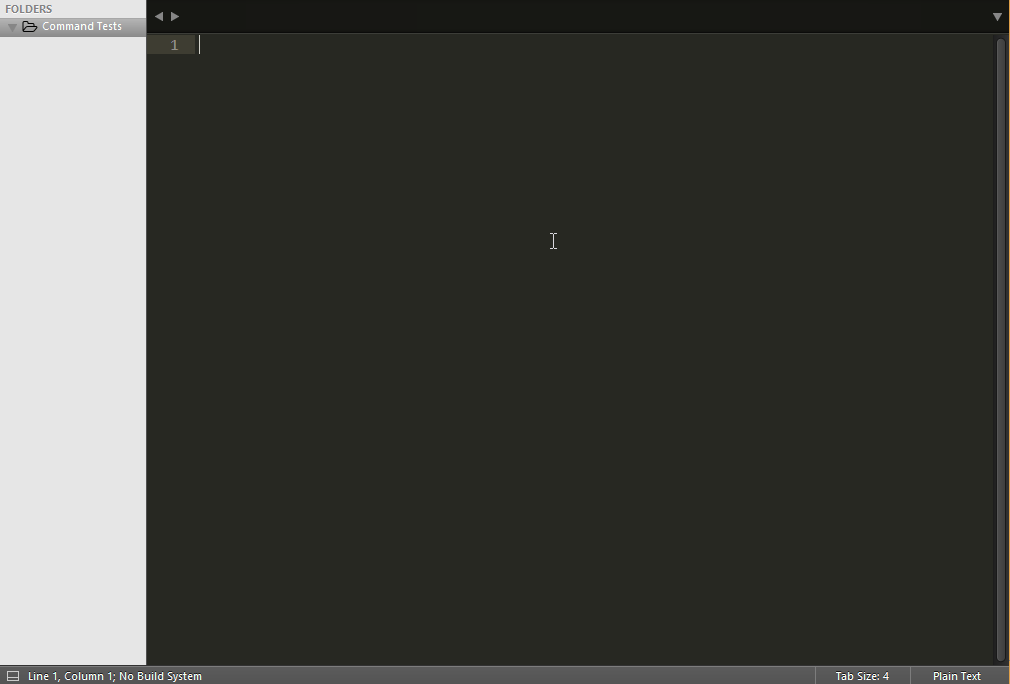
Make migrations, migrate the database or run tests
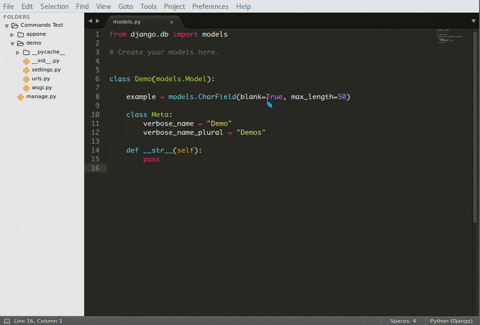
And run the test server
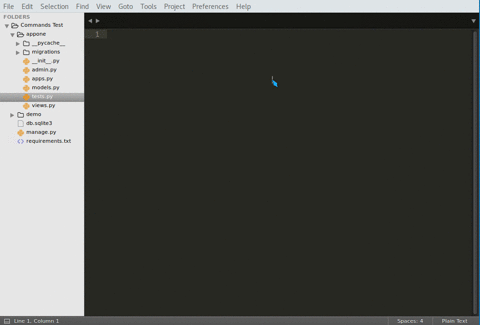
Even run tests
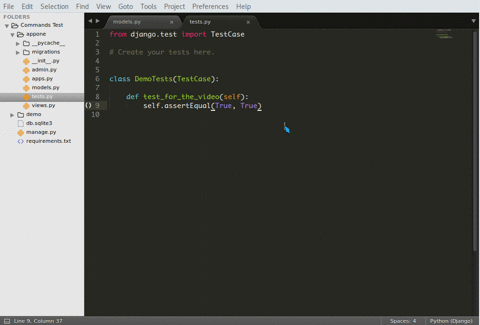
You can also run Django: Custom Command to access other manage.py commands. Try Django: Help and you will get full list of commands provided by each application.
Or you can choose to use Django: Other Command to list and run all commands available to manage.py
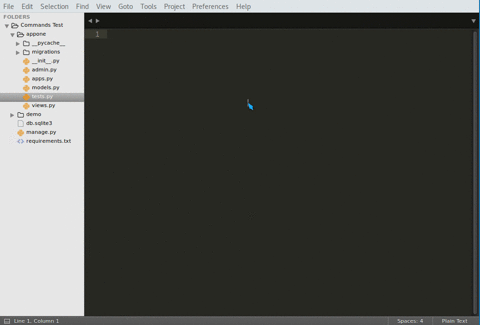
Currently tested on Windows 7/8/10, Mac OS, Ubuntu and many other linux distros.
Everything tested and running!
- Virtualenv support
- Django boilerplate
- Install your dependencies
- Install new pip packages
- Open and search in django documentation from the editor
- Run custom servers
- PostgreSQL specific features snippets
- And More!
Installation
Package Control
The easiest way to install this is with Package Control.
- If you just went and installed Package Control, you probably need to restart Sublime Text before doing this next bit.
- Bring up the Command Palette (Command+Shift+p on OS X, Control+Shift+p on Linux/Windows).
- Select “Package Control: Install Package” (it'll take a few seconds)
- Select
Django Manage Commandswhen the list appears.
Package Control will automatically keep plugin up to date with the latest version.
Use
Commands
Currently supports following commands:
Django:
Django: New ProjectDjango: New AppDjango: Run ServerDjango: Run Custom ServerDjango: BoilerplateDjango: TestDjango: Test AllDjango: ShellDjango: DB ShellDjango: Custom CommandDjango: Other CommandDjango: CheckDjango: HelpDjango: Open DocsDjango: Search in DocsDjango: Make MigrationDjango: SQLMigrationDjango: Migrate DatabaseDjango: List MigrationsDjango: Click
Virtual Environment:
Django: Set Virtual EnvironmentDjango: Terminal HereDjango: Pip FreezeDjango: Pip Freeze To FileDjango: Pip Install PackagesDjango: Pip Install RequirementsDjango: Set Project InterpreterDjango: Use Default Interpreter
Settings
python_bin: path to python interpreterpython_version: default python interpreter versionpython_virtualenv_paths: list of paths where virtualenvs are located (ex:~/.virtualenvs/)*server_host: host for the runserver commandserver_port: port for the server to listenlinux_terminal: Linux only, used to define a custom command line emulator**osx_terminal: Mac OSX only, used to define a custom terminal emulator.***browser_after_runserver: set true to open a browser pointing to the root url after a run server command.project_override: (Boolean) Per project setting “python_interpreter” overrides “python_bin”server_custom_command: Per project setting to specify a custom server to run
Each setting has it's own explanation and some examples of use at the default settings file.
*It's important to set your envs directories
*The folders in this list should be the parent folder of the virtualenv folder, not the virtualenv folder itself
**Default is x-terminal-emulator with a fallback to xterm
***Default is Terminal
